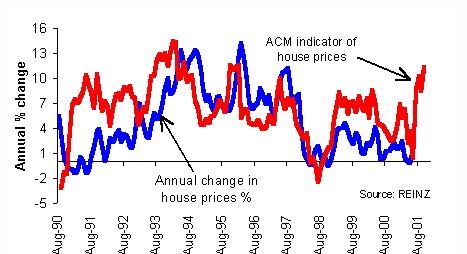Now is the time to buy a house
Alliance Capital’s indicator for house price increases show that for those considering buying a home, now is a good time to buy.
Monday, August 6th 2001, 8:34PM
Alliance Capital’s indicator for house price increases show that for those considering buying a home, now is a good time to buy.
Looking at the graph (see below), house prices increased by as much as 10% during the 1990s, although growth has seldom dropped below zero.
Although it’s difficult to attribute a clear reason for this, it is possible that changes in family structure have played a part in influencing growth in demand for housing.
New Zealand’s population growth is small compared to many other countries, but we have seen a significant decrease in the number of people per household, due to social changes in family structures.
A reduction in the number of people per household tends to bolster the requirement for houses.
The labour market is also an important factor, influencing the price of houses in two ways: Firstly, if people earn more, they tend to be more willing to pay more for houses. Secondly, immigration to New Zealand is closely related to labour market conditions.
When the labour market is tight here and employers find it difficult to recruit local labour, migrants may therefore be more encouraged to come to New Zealand.
Net migration in the June quarter was the strongest since late 1997. More migrants mean higher demand for housing, above existing domestic demand.
The tight labour market is evidenced by NZIER’s Quarterly Survey of Business Opinion, showing that the difficulty of recruiting labour is at an extreme level, and the ANZ job advertisements survey (up 7.8% in the year to June 2001).
Total earnings growth continues to accelerate, and is now up 5.4 in the year to February 2001.
Inflation is only likely to be suppressed by interest rates when they are higher than inflation itself.
When they are lower than inflation they are likely to encourage it to go higher. So, this is why economists are more likely to look at the "real" interest rate (after inflation) when observing effects on market prices.
Historically, real interest rates have fluctuated between 2.0% and 8.0% in New Zealand. The current 3.0% is certainly stimulative – further encouraging people to buy houses, and to buy at higher prices.

Alliance Capital is currently overweight in building stocks in the Australasian equities portfolio, to benefit from earnings growth accruing from increased profitability in the industry.
Darryl Briggs is an analyst with AXA| « Banxrobber aims to capture mortgage refinancing | Banks become regulators » |
Special Offers
Commenting is closed
| Printable version | Email to a friend |



